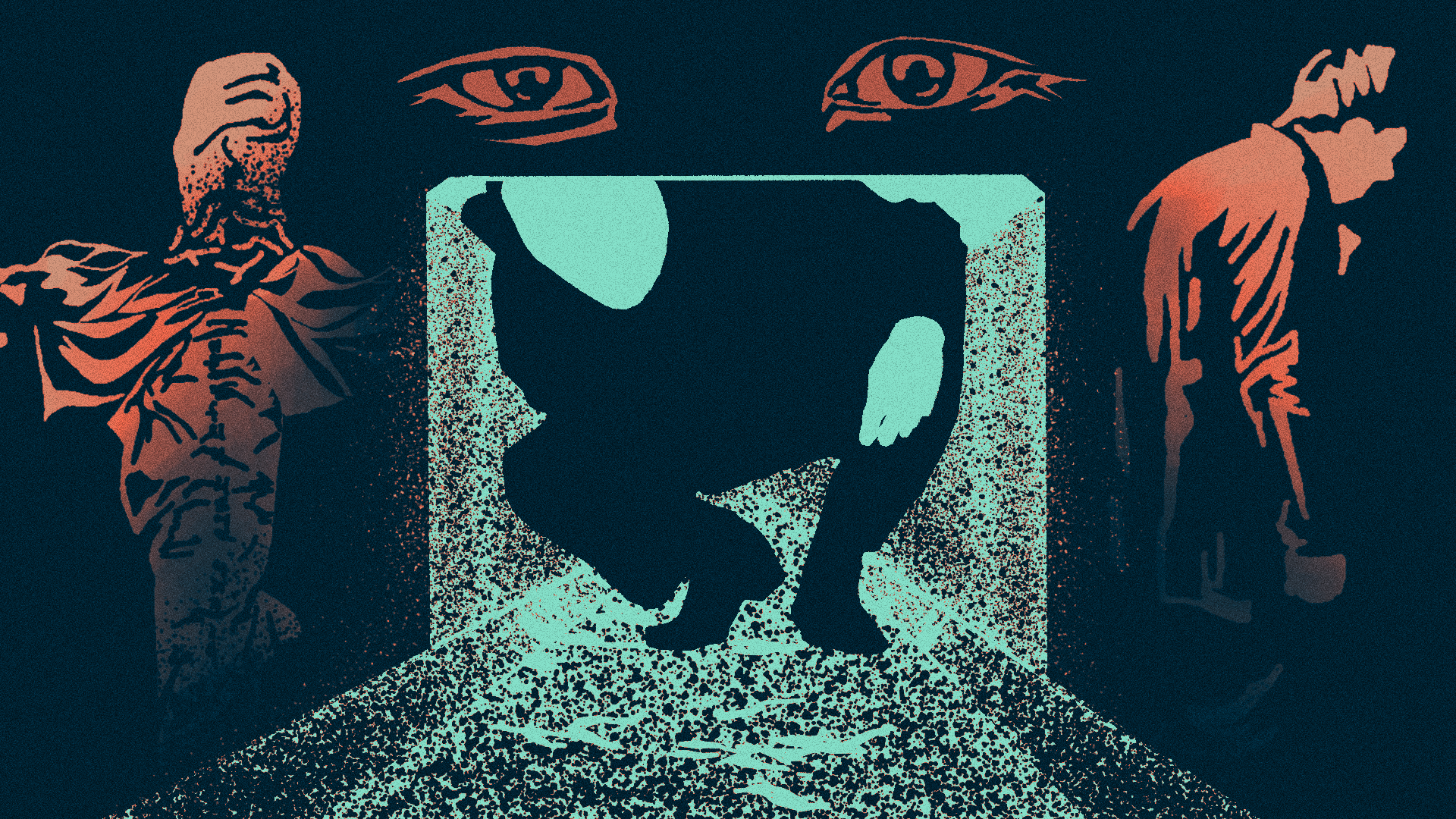
illustration by Brian Fabry Dorsam.
What is my motivation? It’s an obsession, so it’s always hard to break it down and really understand it.
— James Renner, author of “True Crime Addict: How I Lost Myself in the Mysterious Disappearance of Maura Murray”
In early July, the Baltimore City Circuit Court vacated the conviction of Adnan Syed, the subject of the first season of the incredibly popular podcast “Serial.” Syed, who was convicted of strangling his ex-girlfriend Hae Min Lee in 2000, will now receive a new trial.
Sarah Koenig, the host and executive producer of “Serial,” responded to the news on their website:
Last week, when I saw the news that Judge Martin P. Welch granted Adnan a new trial, I happened to be on Skype with our Executive Producer Julie Snyder, and both of us did exactly the same involuntary thing of sucking in our breath and then putting our hands over our mouths. We weren’t so much shocked because of the legal arguments, but because it was such a longshot, this outcome.
The American public’s fascination with true-crime stories and unsolved murders has risen dramatically since the end of “Serial”’s first season. Of course, the public has been fascinated with murder and crime since at least the 19th century, during which disturbingly detailed stories of murder were published regularly in American newspapers.
But today, true-crime has evolved into an even more powerful cultural phenomenon, where not only does the narrator act as reporter, but may step in as crime-solver as well. The vacation of Syed’s conviction and order for a new trial is a remarkable demonstration of this development. With public interest piqued, shows such as Netflix’s “Making a Murderer” — which re-investigated the murder conviction of Colin Avery — and the several spin-off podcasts and books-to-come about Syed have begun to premier to much fanfare.
The development has spread beyond entertainment-industry buzz. Not only are journalists and TV producers getting involved in crime-solving, but everyday social media users are as well. With the advent of the internet, ordinary citizens have the tools to get involved in real investigations; occasionally, they even help solve the crimes.
The Boston Globe reported on this growing number of volunteers, armed with only the internet and a fiery dedication, who have worked to match missing persons cases to unidentified bodies in Boston’s morgues.
Sheree Greenwood, a mental health counselor in Boston, was one of the amateur sleuths who made a surprising breakthrough. Working with fellow sleuths on the Doe Network, a site “devoted to assisting investigating agencies in bringing closure to national and international cold cases,” Greenwood was able to identify a victim based upon an overlooked clue: a T-shirt.
Because she had a background in T-shirt screen-printing, Greenwood noticed that the victim’s shirt had a Native American emblem and was able to trace it back to the original designer. Using a tip that one of the designer’s attendees had given the shirt to a woman from Baltimore, police identified the missing person as Brenda Wright — a woman whose family had reported her missing and had no idea of her fate.
Yet, not all amateur sleuths solve cold cases quite so easily.
James Renner, author of “True Crime Addict,” became deeply engrossed in one such cold case. On his blog and in his book, Renner detailed his failed attempt to solve the mysterious disappearance of Maura Murray.
A popular story shared often among internet sleuths, 21-year-old Murray was last seen February 9, 2004, when she drove her car into a snowbank along a highway near Haverhill, New Hampshire. A school-bus driver stopped that evening to see if she was okay, and Murray assured him that AAA was on the way and told him not to call the police. The bus driver nevertheless called the police once he got home, but when officers arrived, all that was left was the car, a spilled box of wine, and all of Murray’s belongings except for her wallet. There were no footprints leading away from the scene, and no one heard from or saw Murray again.
Early reviews of “True Crime Addict” were positive, but some took issue with Renner’s abrupt and intrusive jump into the investigation and Murray’s private life. Michelle Dean of the New Yorker described Renner as obsessive, “without any evident self-awareness,” writing that he is “neither gentle nor delicate, and he tends to think that an unwillingness to talk to him is a reason to classify someone as suspicious.”
“Like most of us,” Dean wrote, “Renner encountered Murray’s case many years after her disappearance, on the internet. Unlike most of us, he promptly set up a blog and started publishing his ‘findings’ there.”
When no new evidence is discovered, and all leads are effectively cold, what motivates amateur private eyes to continue digging? Are these social media-savvy sleuths really helping, or are they hindering the workings of the criminal justice system?
There is a tendency for such internet sleuthing to turn nasty, and to cause unexpected consequences. After the Boston Marathon bombings in 2013, for example, Reddit users swarmed around and misidentified many individuals as suspects, effectively launching an internet witch-hunt that quickly led to harassment.
“My blog, Reddit, and Websleuths is definitely changing the way crimes are investigated,” said Renner in an email, when asked about his opinion on social media’s influence on investigations. “In the last year I have been contacted by the US Marshals Service and the FBI to help them generate new clues using social media. To solve a cold case you need to distribute the clues to as wide an audience as possible.”
Does it really hurt, then, to have these internet detectives perusing old cases, with the possibility of closure for some of the victims or victims’ families? Or is the motivation rooted somewhere other than a civic duty for justice?
“It’s an obsession,” said Renner. “So it’s always hard to break it down and really understand it.”





















